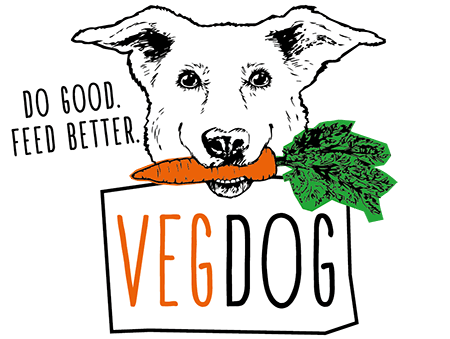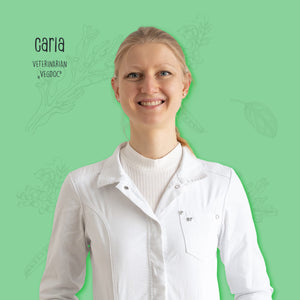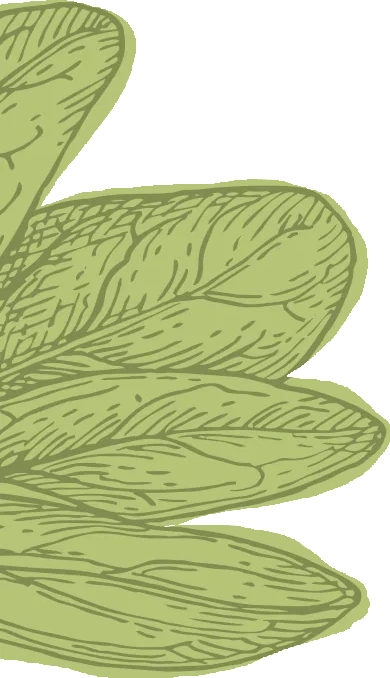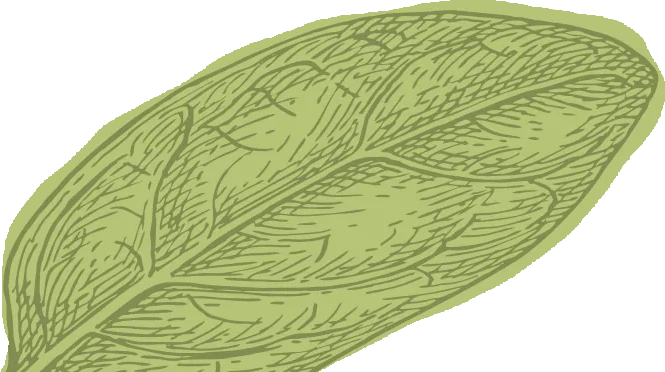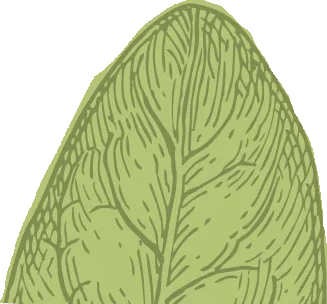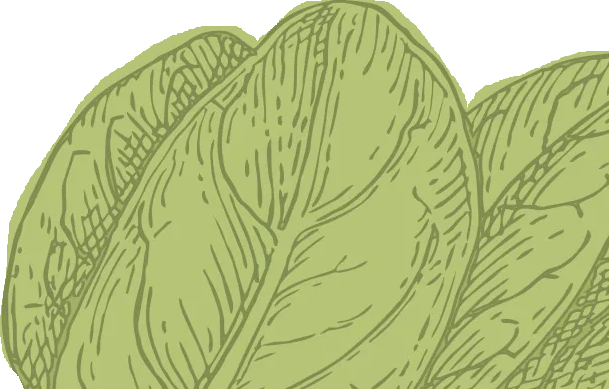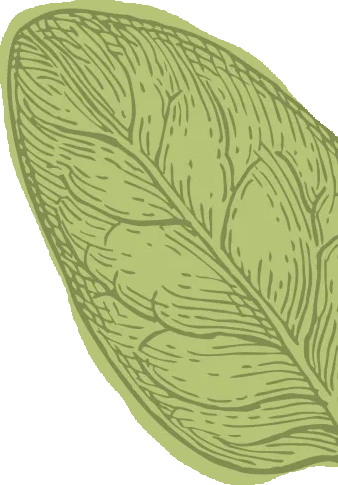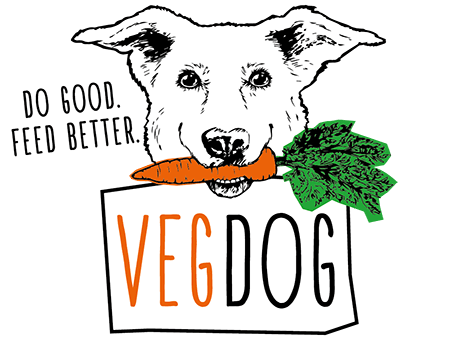
Suitable food for dogs – fruits and vegetables
More and more dog owners want to feed their animals as naturally and healthily as possible. As a result, more and more people are turning to alternative diets or supplementing their dog's food with grains, fruit, vegetables or oils, for example.
 Author: Carla Steffen
Author: Carla Steffen
 Proofreader: Veronika Hajek
Proofreader: Veronika Hajek
Updated: 25.09.2024
Published: 27.05.2024
In this article you will learn:
- Which fruits and vegetables your dog can tolerate
- Which fruits and vegetables your dog cannot tolerate
- How to best prepare fruits and vegetables
- Which vegetables you should not use for BARFing
More and more dog owners want to feed their animals as naturally and healthily as possible. As a result, more and more people are turning to alternative diets or supplementing their dog's food with grains, fruit, vegetables or oils, for example. Nutritional supplements are also becoming increasingly popular.
In this blog post you will learn which fruits and vegetables can be fed to dogs and which varieties are poisonous for your pet. In other blog posts you will also learn more about oils and carbohydrates .
Healthy vegetables for dogs: a detailed table
Vegetables are a healthy way to add to dog food, and they also make a tasty snack between meals. Vegetables can be a source of important nutrients such as fiber, vitamins and minerals that help support health and well-being. However, it is important to know which vegetables your dog can eat and how they should be prepared. The following list shows vegetables that are well tolerated by many dogs:
- Potatoes and sweet potatoes (cooked only)
- Legumes such as lentils, peas and beans (cooked only)
- Cauliflower and broccoli (cooked only)
- carrot and carrot
- fennel
- corn
- spinach
- Chicory
- lettuce
- Cucumber
- kohlrabi
- pumpkin
- zucchini
- Beetroot
- asparagus

Raw, cooked or pureed? How to best prepare vegetables for your dog:
When feeding vegetables, the following applies: Whatever you eat raw, your dog can also eat raw. Everything that you have to cook yourself should also be cooked for your dog.
For example, you can feed raw: carrots, cucumber, lettuce, zucchini, kohlrabi, pumpkin
Should be cooked: corn, fennel, spinach, broccoli, cauliflower, peas, potatoes
If your dog has digestive problems, you should also puree the fruit and vegetables, as these can sometimes be difficult to digest. Please make sure to wash the vegetables well, especially if they are fed with the skin on. Many dog owners also like to use organic quality. You can alternate the different varieties as you like. But be aware that legumes and corn contain more calories because they are starchy.
Suitable Fruit for Dogs: A Comprehensive List
Adding fruit to your dog's diet can be a delicious and healthy addition. Fruit and berries can be a source of important vitamins, antioxidants and fiber that promote your dog's health. However, it is important to pay attention to the amount and selection of fruit. The following types of fruit are well tolerated by dogs:
- Apple
- banana
- Berries such as blackberries, strawberries, blueberries, raspberries and currants
- Stone fruits such as peaches, apricots, cherries and plums (only in moderation and without stones)
- melon
- Orange and kiwi (in small quantities)

This is what you should consider when preparing fruit
Fruit can also be combined and varied - depending on what your dog can tolerate. Suitable fruits include apples, oranges, bananas, raspberries, strawberries and melons .
You don't need to worry about the fructose it contains. However, for obese animals, the amount of banana should be kept to a minimum and dried fruit should be avoided if possible. This has a higher calorie content and can also lead to flatulence and diarrhea. Fruit pits should be removed as they contain hydrogen cyanide.
Please wash the fruit thoroughly before feeding it. Here too, you can let your imagination run wild when preparing it - from chopped to grated to smoothies - anything that is fun is allowed. Read our articles Smoothies for dogs and Summertime is ice cream time .
Feed fruits and vegetables in moderation
Alternating different types of fruit and vegetables will add variety to your dog's diet. You can let your imagination run wild when it comes to individual supplements to the dog's food. However, please make sure that you do not mix the ready-made food by more than about 10%, as this can lead to nutrient imbalances. Self-composed rations and mixed rations of ready-made food and home-cooked food should always be checked by a veterinarian and supplemented with a mineral feed if necessary.
What you should consider when BARFing
When BARFing, you can use almost any fruit and vegetables that are suitable for your furry friend. However, make sure you use the right composition. This varies depending on the size and breed of each four-legged friend. Therefore, talk to your veterinarian to avoid causing nutritional deficiencies in your furry friend through incorrect feeding. However, you should remove the following vegetables from your furry friend's menu when BARFing:
- raw potatoes
- unripe tomatoes
- bulbous plants
- green or yellow peppers
Caution: The following is poisonous for your four-legged friend

Fruit: grapes, raisins, avocado
For detailed information on foods that are toxic to dogs, please read our blog What shouldn't dogs eat ?
Vegetables for Dogs to Lose Weight
Incorporating vegetables into a dog's diet can be a helpful strategy to promote weight loss in overweight animals. Due to their low calorie density, vegetables can help with weight loss. By replacing part of the usual food with healthy portions of vegetables, you can reduce overall calorie intake while providing important nutrients. Alternatively, you can replace the treats between meals with vegetables such as cucumbers or carrots.
However, it is advisable to consult your veterinarian beforehand to establish a suitable nutritional plan.
Do you have any further questions? Contact us at tierarzt@vegdog.de. Our veterinarians will be happy to help you.
Your VEGDOG team
Frequently Asked Questions (FAQ)
Can dogs eat fruits and vegetables?
Yes, many fruits and vegetables are easily digestible for dogs. They can be a healthy addition to the diet as long as they are offered in appropriate quantities and forms.
Why should I include fruits and vegetables in my dog’s diet?
Fruits and vegetables provide additional vitamins, minerals and fiber that can help promote overall health and digestion. In addition, they can also serve as low-calorie rewards.
How much can I feed my dog?
Ready-made food should not be cut by more than 20%, as this can lead to nutrient imbalances. In addition, the amount of fruit and vegetables a dog can eat depends entirely on the type of fruit and vegetables. The size, activity and health of the dog also play an important role.
